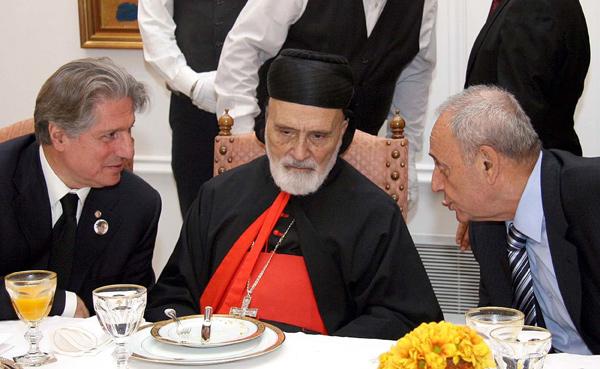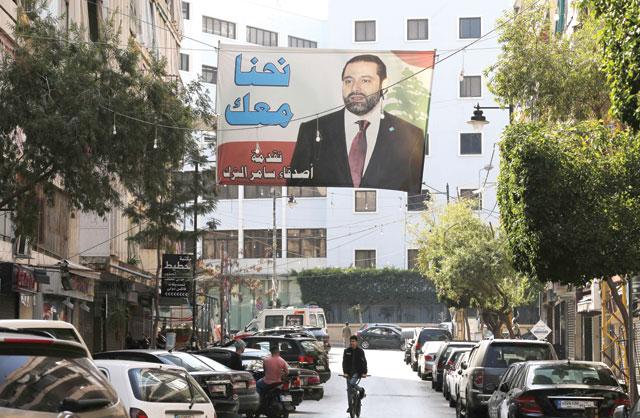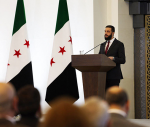You are here
Lebanon’s ex-Maronite patriarch dies days before turning 99
By AFP - May 12,2019 - Last updated at May 12,2019

This file handout photo, taken on September 9, 2008, shows former Lebanese president Amin Gemayel (left) and Maronite Cardinal Nasrallah Sfeir (centre) listening to parliament speaker Nabih Berri during an Iftar meal at the presidential palace in Baabda (AFP photo)
BEIRUT — Lebanon's former Maronite patriarch Nasrallah Boutros Sfeir, who wielded considerable political influence during the country's civil war and was an ardent advocate of a Syrian troop withdrawal, died on Sunday, the Church said.
Sfeir, who was set to turn 99 on Wednesday, died at 3:00am (00:00 GMT) "after days of intensive medical care", said a statement by the Maronite Church.
He became the leader of the Church in 1986 until he resigned in 2011 due to his declining health, and held the title "76th Patriarch of Antioch and the Whole Levant".
He was a respected power broker during the 1975-1990 civil war, which saw bitter infighting between rival militias including opposing Christian factions.
Sfeir, who spoke fluent Arabic and French, was made a cardinal by Pope John Paul II in 1994.
Born in 1920 in Rayfoun, a village in Lebanon's Kesrwan Mountains, Sfeir studied theology and philosophy but was never shy to delve into Lebanon's tumultuous politics.
His backing of the 1989 Taif agreement that brought the 15-year civil war to an end bolstered Christian support for the accord, but reduced the powers of the presidency — a seat reserved for Lebanon's Maronite Christians under the country's confessional power-sharing.
Maronite Christians made up the most powerful single community prior to Lebanon's 1975-1990 civil war, but their influence has since waned as they have been outnumbered by Shiite Muslims in the multi-sectarian country.
Sfeir also spearheaded the opposition to Syria's three decades of military and political domination over Lebanon.
"His biggest struggle was to end the Syrian presence in Lebanon, which we all thought was impossible because of the divisions in Lebanon," his biographer Antoine Saad told AFP.
"But he worked on it steadily, objectively, meticulously and quietly," he said.
Sfeir refused to visit Syria during his time as patriarch, even when John Paul II made a trip to the country in 2001.
His outspokenness helped swell the anti-Syria movement in 2000.
It eventually led to the withdrawal of thousands of Syrian troops from the country five years later, following the assassination of former prime minister Rafik Hariri, whose murder the opposition blamed on Damascus.
Premier Saad Hariri, the son of Rafik, on Sunday called Sfeir a "national symbol" who had worked "to bring Lebanon back to its natural status as a free and independent sovereign country".
The Cabinet announced two days of national mourning set for Wednesday and Thursday.
President Michel Aoun said Lebanon had lost one of its "most prominent patriarchs".
After he stepped down, Sfeir's opinion and advice continued to be sought by politicians of all stripes, not only Christians.
"He was completely against war," Hariri said of the cleric who enjoyed hiking in nature until his late years.
"His loss can't be compensated for."
Related Articles
BEIRUT — Lebanese political leaders and thousands of other people gathered on Thursday for the funeral of the former Maronite patriarch, Car
AMMAN — Deputising for His Majesty King Abdullah, Chargé d’Affaires of the Jordanian Embassy in Lebanon Wafaa Atyam offered her condolences
BEIRUT — Lebanon's president will not accept the resignation of prime minister, Saad Al Hariri, until he returns to Lebanon, palace sources














